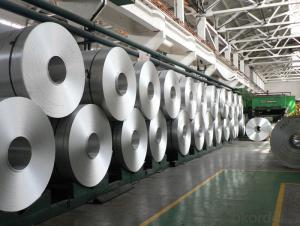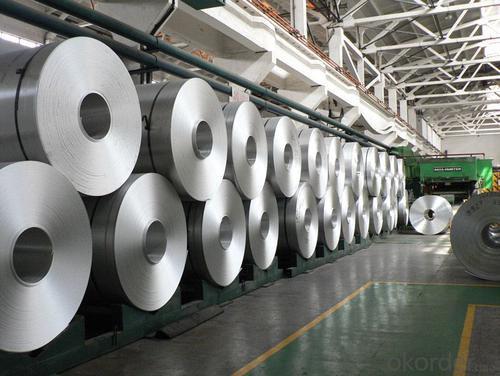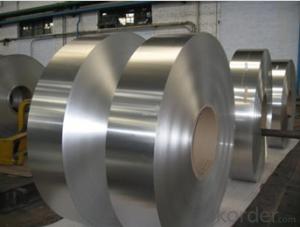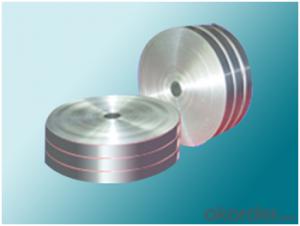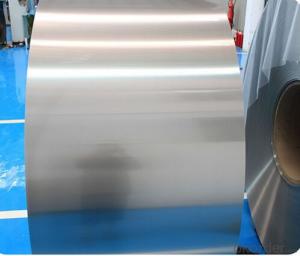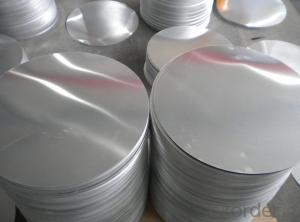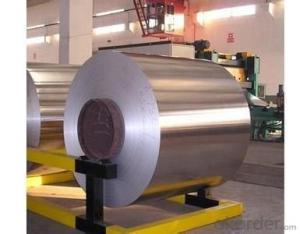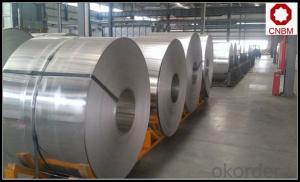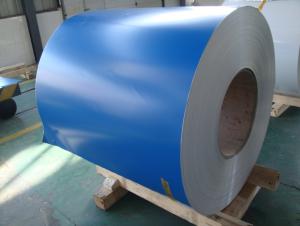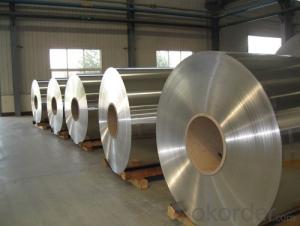1050 Aluminum Alloy Coil Sheet - Hot Rolled 4.5mm
- Loading Port:
- China Main Port
- Payment Terms:
- TT OR LC
- Min Order Qty:
- -
- Supply Capability:
- -
OKorder Service Pledge
Quality Product, Order Online Tracking, Timely Delivery
OKorder Financial Service
Credit Rating, Credit Services, Credit Purchasing
You Might Also Like
We produce prepainted aluminum coil and strip for aluminum twist off and crown caps production professionally.
The detail information as following:
Thickness :0.10mm-0.30mm
Prepainted: PE, PVDF and others
Width :20-1500mm
Alloy : 8011 mainly
Temper : H16
Usege: Twist off and caps
Pack details:pack in rolls with plastic film by wooden box.
Container loading: 1x20ft container can load about 18 tons.
- Q: This question asks for methods to determine the age of an aluminum coil, distinguishing between new and old.
- <p>To determine if an aluminum coil is new or old, you can look for several indicators: the surface condition, such as scratches or signs of wear; the quality of the protective coating, if any, which may degrade over time; the manufacturing date or batch number, if available; and the overall appearance and shine. New coils typically have a smooth, shiny surface with no significant scratches or dents, and a consistent protective coating. Old coils may show signs of oxidation, discoloration, or other forms of degradation. Additionally, testing the coil's physical properties, such as tensile strength, can provide clues about its age, as these properties can degrade over time.</p>
- Q: Can aluminum coils be used for window frames?
- Yes, aluminum coils can be used for window frames. Aluminum is a popular choice for window frames due to its lightweight, durable, and corrosion-resistant properties. It is also easily customizable and can be painted or anodized to achieve different aesthetics.
- Q: Is it possible to utilize aluminum coil in the welding process?
- <p>Yes, aluminum coil can be used for welding. It is commonly used as a filler material in processes like MIG (Metal Inert Gas) welding, where it is fed continuously into the weld pool to create a joint. Aluminum welding requires specific techniques and equipment due to its high thermal conductivity and the need to prevent oxidation. The aluminum coil must be of high quality and clean to ensure a strong, corrosion-resistant weld.</p>
- Q: I can't figure out what the metabolic role of aluminum is. Been searching for a while and can't seem to find anything concrete.If you can, please include sources. Thanks!
- I okorder /
- Q: How are aluminum coils tested for surface hardness?
- To ensure the quality and suitability of aluminum coils for various applications, a variety of methods are employed to test their surface hardness. One commonly used method is the Rockwell hardness test. During the Rockwell hardness test, a specified amount of force is applied to the surface of the aluminum coil using either a diamond or hardened steel ball. The depth of the resulting indentation made by the ball is then measured, and a hardness value is determined by comparing the difference in depth before and after the force is applied. This value is then compared to a hardness scale in order to assess the surface hardness of the aluminum coil. Another method utilized is the Brinell hardness test. In this test, a specified force is applied to the surface of the aluminum coil using a hardened steel ball. The resulting indentation's diameter is measured, and a hardness value is calculated based on the applied force and indentation size. This value is then compared to a hardness scale to determine the surface hardness of the aluminum coil. Both the Rockwell and Brinell hardness tests are non-destructive and provide accurate measurements of the surface hardness of aluminum coils. These tests enable manufacturers and customers to ensure that the coils meet the necessary hardness criteria for their intended applications, such as in the automotive or construction industries. By conducting surface hardness tests, any potential issues like brittleness or insufficient strength can be identified and addressed prior to the utilization of the aluminum coils in the production process.
- Q: Can aluminum coils be used for heat transfer applications?
- Yes, aluminum coils can be used for heat transfer applications. Aluminum is known for its excellent thermal conductivity, which means it is highly effective in transferring heat. Aluminum coils are commonly used in various heat transfer applications such as air conditioning systems, refrigeration units, and heat exchangers. The lightweight and corrosion-resistant properties of aluminum also make it a popular choice for these applications. Additionally, aluminum coils can be easily shaped and formed, allowing for efficient heat transfer in complex systems.
- Q: Are aluminum coils suitable for electrical conductors?
- Aluminum coils, indeed, prove to be suitable for electrical conductors. Due to its remarkable electrical conductivity, aluminum has become a widely utilized material in the electrical industry. It possesses approximately 61% conductivity in comparison to copper, the utmost commonly employed metal for electrical conductors. Lightweight, cost-effective, and possessing good thermal conductivity, aluminum coils have become a favored selection for a range of electrical applications. Nonetheless, it is noteworthy that aluminum has a lower tensile strength than copper, thus potentially demanding a larger cross-sectional area to attain an equivalent level of current carrying capacity. Furthermore, to prevent oxidation and guarantee efficient electrical conductivity in aluminum coils, it is imperative to employ proper insulation and connectors.
- Q: How do I write ionic formula for Sodium Aluminum Silicate? Please explain in a easy way ,,,,,,,,,,,,
- www.okorder /
- Q: Is it possible to create personal roofing material using aluminum coils?
- <p>Yes, you can use aluminum coils to make your own roofing material. Aluminum is a popular choice due to its durability, lightweight, and resistance to corrosion. To create roofing material, you would need to cut the coils to appropriate lengths, form them into panels, and possibly add protective coatings or finishes. However, this process requires specialized equipment and knowledge of roofing construction to ensure the material is safe, watertight, and structurally sound. It's also important to consider local building codes and regulations that may affect the suitability of homemade roofing materials.</p>
- Q: Can aluminum coils be used in the production of electrical transformers?
- Yes, aluminum coils can be used in the production of electrical transformers. Aluminum coils offer several advantages such as being lighter in weight, having better thermal conductivity, and being more cost-effective compared to traditional copper coils.
Send your message to us
1050 Aluminum Alloy Coil Sheet - Hot Rolled 4.5mm
- Loading Port:
- China Main Port
- Payment Terms:
- TT OR LC
- Min Order Qty:
- -
- Supply Capability:
- -
OKorder Service Pledge
Quality Product, Order Online Tracking, Timely Delivery
OKorder Financial Service
Credit Rating, Credit Services, Credit Purchasing
Similar products
Hot products
Hot Searches
Related keywords
